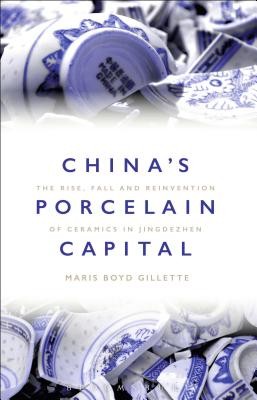
- We will send in 10–14 business days.
- Author: Maris Boyd Gillette
- Publisher: Bloomsbury Academic
- ISBN-10: 1350044822
- ISBN-13: 9781350044821
- Format: 15.8 x 23.1 x 1.5 cm, softcover
- Language: English
- SAVE -10% with code: EXTRA
Reviews
Description
Maris Boyd Gillette's groundbreaking study tells the story of Jingdezhen, China's porcelain capital, from its origins in 1004 in Song dynasty China to the present day.
Gillette explores how Jingdezhen has been affected by state involvement in porcelain production, particularly during the long 20th century. She considers how the Chinese government has consumed, invested in, taxed and managed the local ceramics industry, and the effects of this state intervention on ceramists' lives, their local environment and the nature of the goods they produce. Gillette traces how Jingdezhen experienced the transition from imperial rule to state ownership under communism, the changing fortunes of the ceramics industry in the early 21st century, the decay and decline that accompanied privatisation, and a revival brought about by an entrepreneurial culture focusing on the manufacture of highly-prized 'art porcelain'.EXTRA 10 % discount with code: EXTRA
The promotion ends in 18d.03:43:42
The discount code is valid when purchasing from 10 €. Discounts do not stack.
- Author: Maris Boyd Gillette
- Publisher: Bloomsbury Academic
- ISBN-10: 1350044822
- ISBN-13: 9781350044821
- Format: 15.8 x 23.1 x 1.5 cm, softcover
- Language: English English
Maris Boyd Gillette's groundbreaking study tells the story of Jingdezhen, China's porcelain capital, from its origins in 1004 in Song dynasty China to the present day.
Gillette explores how Jingdezhen has been affected by state involvement in porcelain production, particularly during the long 20th century. She considers how the Chinese government has consumed, invested in, taxed and managed the local ceramics industry, and the effects of this state intervention on ceramists' lives, their local environment and the nature of the goods they produce. Gillette traces how Jingdezhen experienced the transition from imperial rule to state ownership under communism, the changing fortunes of the ceramics industry in the early 21st century, the decay and decline that accompanied privatisation, and a revival brought about by an entrepreneurial culture focusing on the manufacture of highly-prized 'art porcelain'.

Reviews